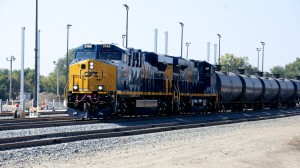Senator Casey tells Obama Administration to speed up rail safety initiative

NAT HAMILTON/WHYY NEWS
A CSX unit train delivers a load of crude oil from the Bakken Shale in North Dakota to a refinery in South Philadelphia.
In the wake of the fiery oil train derailment last week in West Virginia, which forced dozens of residents to evacuate and had the state’s governor declare a state of emergency, Pennsylvania Senator Bob Casey says the Obama Administration should speed up authorization for rail safety improvements. Casey says the rules, which included new funding approved last year as part of an omnibus bill, are stalled at the Office of Management and Budget.
Casey sent a letter to OMB Director Shaun Donovan, urging him to speed up their review of the rule.
“If we don’t push hard to get it through the process, the process will take as long as people want it to take,” Casey told reporters on a conference call.
The rules include strengthening tank cars, reviewing speed limits, improving training for first responders, as well as funds to hire 15 new rail safety inspectors and retain 45 inspectors hired last year.
“These derailments have raised serious questions about the need to address efforts to prevent future accidents,” said Casey.
Crude oil shipments by rail have risen dramatically in the past several years due to the shale oil boom in North Dakota. Pennsylvania is one of the largest destinations for Bakken crude. According to information posted by CSX and Norfolk Southern on the PEMA website, up to 30 trains, each carrying more than 1,000,000 gallons of crude oil, and operated by Norfolk Southern or CSX, pass through Pittsburgh each week. Philadelphia can get up to 42 oil trains a week rolling on its tracks. Statewide, about 60 oil trains travel through Pennsylvania on their way to refineries in Philadelphia and New Jersey. Each tank car can carry up to 700 barrels of oil. Trains above 1,000,000 gallons would have at least 45 tankers.
The bill also provided $3 million for track inspections on crude oil routes and establish a “short line safety institute” for training and oversight of short lines.
Norfolk Southern issued a statement in support of increased safety regulations.
No matter what comes out of proposed new regulations, NS wants the safest tank car to be moving on our network because safety is our top priority – safety of our employees, safety of our customers’ products, safety of the communities in which we operate.
The company says that as a “common carrier” it is required to haul hazardous material as long as the tank cars meet current federal safety regulations. CSX says it also favors the updated rules.
Within the past year, oil trains derailed in Philadelphia, Vandergrift and McKeesport. The oil tank cars involved in the West Virginia incident were considered the most up to date and stronger than the vast majority of tank cars hauling crude oil across the country. Also, the Federal Railroad Administration said the West Virginia derailment occurred while the train was accelerating, but traveling far below the posted speed limit.
Correction: A previous version of this piece miscalculated the number of trains passing through Pittsburgh and Philadelphia each week based on data submitted to the Pennsylvania Emergency Management Agency.
















